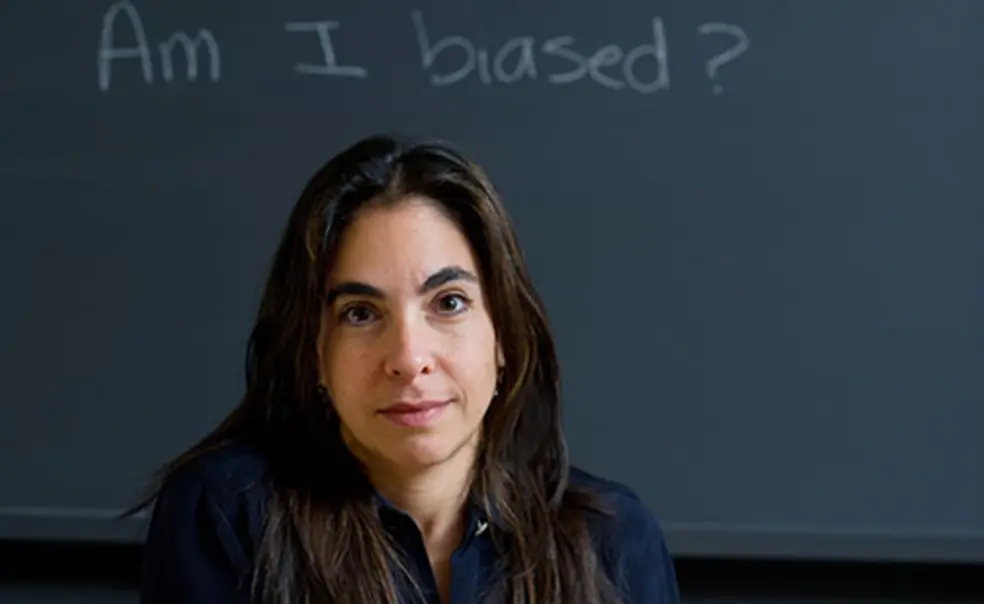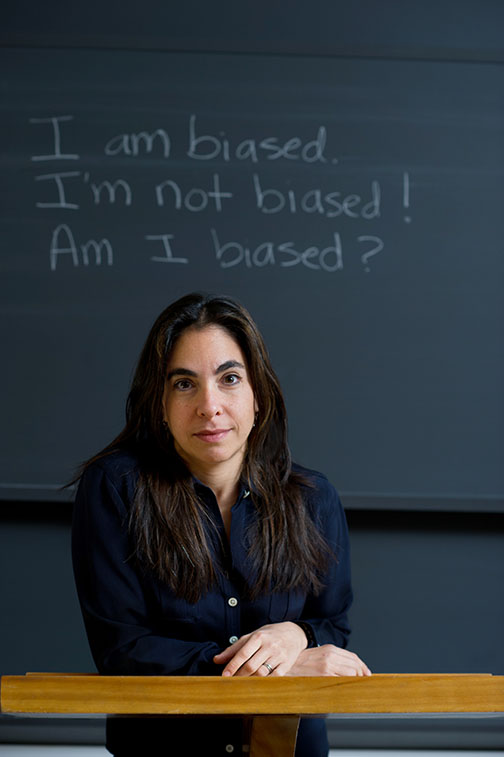Psychology: You Be the Judge
We’re hopelessly biased, Professor Emily Pronin says, but we don’t realize it
If you’re like most people, you consider yourself a fair and reasonable person, able to make more objective judgments than most. The problem is, however, that other people think they are reasonable, too.
Psychology professor Emily Pronin has found that people often have a “bias blind spot” — they think of themselves as objective and others as biased, and are unable to see that they themselves are biased, too. This has implications for everything from hiring practices to international conflict resolution. Recognizing this problem is an important first step in forming policies that circumvent bias, Pronin says.
Pronin long has been interested in the difference between how we perceive ourselves and how we perceive others. To that end, her studies have demonstrated that people are blind to a number of biases in themselves that they can see in others. These include tendencies to see themselves as more able than others (self-enhancement bias), to give themselves too much credit for success and too little for failure (self-serving bias), to act in ways that serve their own best interests (self-interest bias), and to form political views based on partisanship and ideology rather than reasoned analysis (ideological bias).
The tendency to see others as biased can foster conflict, Pronin has found. Seeing the other side as biased amps up one’s antagonism. The other side views that behavior as unreasonable and assumes the opposing side must be biased, which leads to an antagonistic response, fueling a “spiral of conflict.” This makes it difficult to come to a reasonable agreement “or even to sit down at the table and talk,” says Pronin, who teaches courses at the Woodrow Wilson School on applying psychology to policy analysis and public affairs.
Pronin also has explored why people don’t recognize their own biases. One reason is something she calls the introspection illusion — when judging ourselves, we have access to our thoughts and motives, and know whether we intend to be, or feel ourselves being, biased (though we often don’t discern our own bias). When judging others, we see only their actions, rather than focusing on others’ thoughts and motives.
The most effective defense against bias is limiting exposure to potentially biasing information, Pronin says. A 2000 study on orchestra auditions by Wilson School Dean Cecilia Rouse found that the use of blind auditions — in which musicians perform behind a screen — increased significantly the number of female orchestra members. The double-blind procedure used in clinical trials — in which a doctor does not know if a patient receives a drug or a placebo — is another example of how withholding information has been used to combat bias.
But eliminating bias from our lives altogether, Pronin says, is next to impossible. “People have a pretty profound tendency to deny bias,” she says, “but at least we can teach people things that might help them understand why they don’t recognize their own biases.”













2 Responses
Poss Parham ’52
10 Years AgoCountering Bias
The article about Professor Emily Pronin (Life of the Mind, Dec. 4) regarding everyone’s “bias blind spot” is certainly a valid reminder of our primal tendencies toward self-interest and exaggerated assumptions of our own capacities. On the other hand, if we are all “hopelessly biased” in such fashion, how is it possible to achieve “reasoned analysis”? Isn’t Professor Pronin’s suggestion of “limiting exposure to potentially biasing information” as the “most effective defense against bias” somewhat unrealistic and contrary to the scientific method — shouldn’t all relevant information be considered? In exercising such a defense, should not a “reasoned analysis” be required to determine what is “potentially biasing” and what is not?
Professor Pronin serves us well in reminding us of human frailty, but it would be helpful to know her path to “reasoned analysis” — if there is one.
Frederic Todd ’67
10 Years AgoCountering Bias
I find that focusing forward makes it much easier to see around bias both in myself and others. Rather than avoiding biased sources, I like to view both sides of media presentations of the same event or series of events. Unbiased presentations are hard to find.